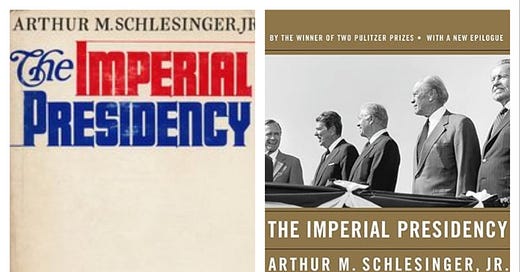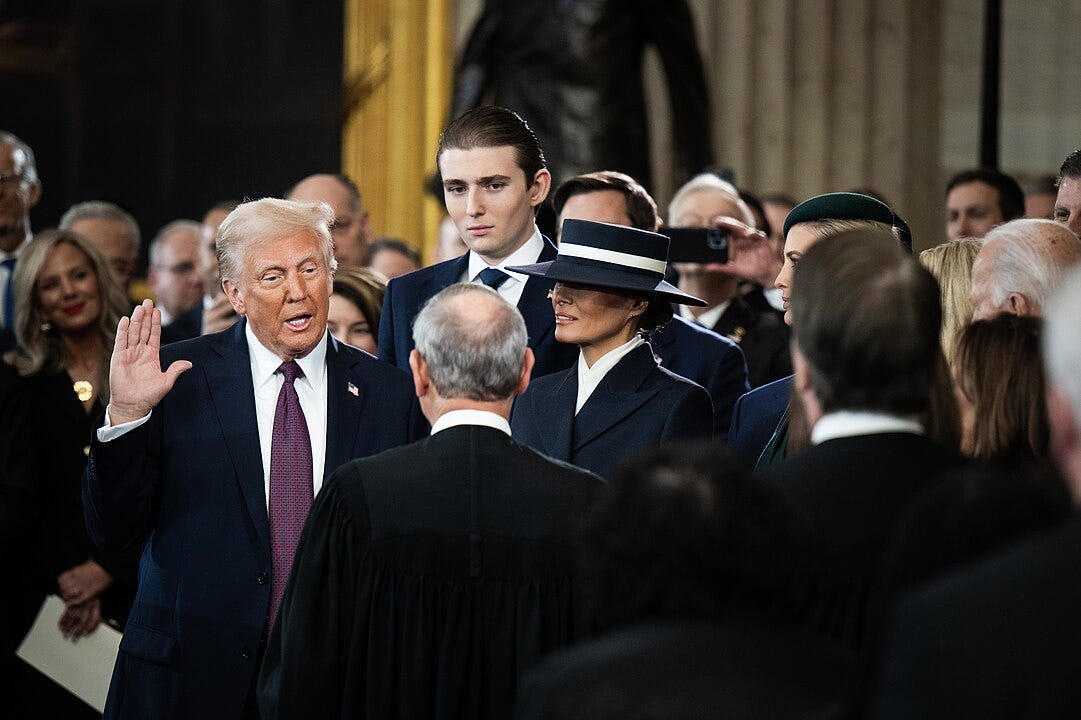The Imperial Presidency, Past and Present
One way that Donald Trump is extending a legacy of the Cold War era
“There is no need for me to outline to you the seriousness of the situation we face today in America,” Charles Lindbergh told an America First rally in Cleveland in August 1941, then proceeded to outline what he saw as a serious crisis for American democracy:
In the past, we have gone on the assumption that our country was governed according to the will of the people. That has been taken for granted as a part of the American system of life. We were taught, even as school children, that government by the people was inseparable from the freedom and liberty for which our forefathers fought. We were taught that, as American citizens, we inherited the right to know about, and to vote upon the fundamental politics of our nation. In the past, we have elected candidates to represent us, and not to rule us. In the past, our President was responsible to our representatives in Congress. And the Supreme Court sat, incorruptibly, as a final safeguard for freedom and justice in our nation. Each one of these branches of government, the Executive, the Legislative, and the Judicial, was intended to be a check upon the others, that our American way of life might be preserved.
But now the question arises whether we any longer have a representative system of government in this country…
The Japanese attack on Pearl Harbor led to the cancellation of his scheduled America First speech that December in Boston, where Lindbergh had planned to accuse Franklin D. Roosevelt of setting up something just “‘short of’ a dictatorial system in America.”
There is no need for me to tell you that Charles Lindbergh did not share FDR’s antipathy for the German dictator whose invasion of the Soviet Union that summer drastically expanded the Second World War and initiated the Final Solution.1 But you don’t have to be an anti-New Deal conservative who saw Nazi Germany as no threat to the United States to share his concern with the expansion of executive power.
Indeed, it was a liberal Democrat with close ties to Eleanor Roosevelt and John F. Kennedy who gave us the language to describe this phenomenon. “The constitutional Presidency,” warned historian Arthur M. Schlesinger Jr. in 1973, “has become the imperial Presidency and threatens to be the revolutionary Presidency” (italics mine).
Having admittedly “contributed to the rise of presidential mystique” through his admiring accounts of JFK, Schlesinger didn’t lament that the 20th century presidency had overcome the “tendency toward inertia” inherent to the constitutional separation of powers: “This was all right for a while: the point of the system as Justice [Louis] Brandeis later observed, was ‘not to promote efficiency but to preclude the exercise of arbitrary power.’ Still efficiency had its claims on government too, especially in a rapidly changing society and even more especially in times of danger.” Schlesinger deemed the “vigorous presidential leadership” of first Woodrow Wilson and then FDR “necessary to overcome the tendency toward inertia. It enabled the American republic to meet the great crises of its history” — including World War II, which “accelerated the change in Roosevelt’s approach to presidential power” that began with his response to the Great Depression.2
But it was the Cold War that truly established the imperial presidency, as politicians of both parties built layers upon layers of executive power on FDR’s foundation.3 The “national security state” inaugurated by Harry Truman and continued by Dwight Eisenhower and JFK, the granting of “war powers” to Lyndon Johnson during the Vietnam War, and Richard Nixon’s refining of what Schlesinger called the “secrecy system” had “produced a conception of presidential power so capacious and peremptory as to imply a radical transformation of the traditional polity. In the last years presidential primacy, so indispensable to the political order, has turned into presidential supremacy.” By 1973, the year that Congress began the Watergate investigations that would lead to Nixon’s resignation, Schlesinger believed that Americans needed “to devise means of reconciling a strong and purposeful Presidency with equally strong and purposeful forms of democratic control.”

In his original book, Schlesinger argued that “the imperial Presidency received its decisive impetus… from foreign policy; above all, from the capture by the Presidency of the most vital of national decisions, the decision to go to war.”4 Conversely, the Soviet collapse that ended the Cold War seemed to complete the backlash against presidential power that started with Vietnam and Watergate: “Because it was the creation of international crisis,” Schlesinger wrote in 1998, as Bill Clinton’s presidency floundered, “the imperial Presidency collapsed once that crisis came to an end.”
Having gone to graduate school (and first read Schlesinger) in the late Nineties, it felt odd to come to the last meeting of my Honors class on the Cold War and find myself closing with a slide on the revival of the imperial presidency under our latest Baby Boomer president.
As I told my students, it’s hard to teach the Trump era in American politics, where it’s hard to discuss so partisan a president in a way that doesn’t feel like taking sides. It’s one thing for me to write critically about the current president at a blog or Substack that I never encourage students to read, quite another for me to inflict my political opinions in a classroom where my task is to help students learn how to think, not what to think.
On the other hand, it would clearly be inadequate to talk about the Cold War in 2025 as if it’s so distant and foreign a past that it has no bearing on the American or global present. Indeed, the final essay in that course asks students to assess whether their own lifetime supports or contradicts Francis Fukuyama’s famously bold conclusion that the end of the Cold War also marked “the end of history,” with the “Western idea” of liberal democracy and free-market capitalism left unchallenged by any meaningful alternative.
So I decided that I should outline, in as balanced a manner as possible, a few ways that the current resident of the White House is either dismantling or extending the legacy of the Cold War.
Keep reading with a 7-day free trial
Subscribe to The Pietist Schoolman to keep reading this post and get 7 days of free access to the full post archives.





